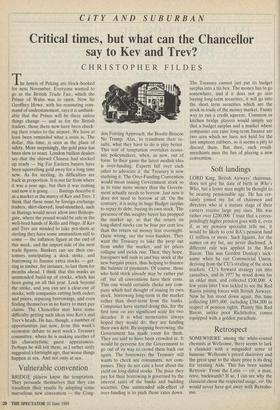Vulriefable convention
BRIDGE players know the temptation. They persuade themselves that they can transform their results by adopting some marvellous flew convention — the Cong-
don Forcing Approach, the Bootle-Briscoe No Trump. Alas, to transform their re- sults, what they have to do is play better. This sort of temptation overtakes econo. mic policymakers, when, as now, out of form. In their game the latest modish idea is over-funding. Experts fall over each other to advocate it, the Treasury is now studying it. The Over-Funding Convention would mean issuing Government stock so as to raise more money than the Govern- ment actually needs to borrow. Just now it does not need to borrow at all. On the contrary, it is using its huge Budget surplus to repay its debt, buying its own stock. The presence of this weighty buyer has propped the market up, so that the return on long-dated stocks can be four per cent less than the return on money lent overnight. Quite wrong, say the over-funders. They want the Treasury to take the prop out from under the market, and let prices collapse and yields rise. Then, they hope, foreigners will rush in and buy stock at the new bargain prices, thus helping to finance the balance of payments. Of course, those who hold stock already may be rather put off, but all conventions have their costs. This one would certainly choke any com- pany which had thought of issuing its own stock, borrowing long-term in the market rather than short-term from the banks. Companies have started doing this, for the first time on any significant scale for two decades. It is what monetarists always hoped they would do; they are funding their own debt. By stopping borrowing, the Government has made room for them. They are said to have been crowded in. It would be perverse for the Government to go out of its way to crowd them back out again. The borrowers the Treasury still wants to check are consumers, not com- panies. They do not care a hoot about the yield on long-dated stocks. The price they pay for their borrowing is governed by the interest rates of the banks and building societies. One unintended side-effect of over-funding is to push those rates down.
The Treasury cannot just put its budget surplus into a tin box. The money has to go somewhere, and if it does not go into buying long-term securities, it will go into the short term securities which are the stock in trade of the money market. Funny way to run a credit squeeze. Common or kitchen bridge players would simply say that a budget surplus and a market where companies can raise long-term finance are two aces which we have not held for the last umpteen rubbers, so it seems a pity to discard them. But then, such result- merchants miss the fun of playing a new convention.


























































 Previous page
Previous page